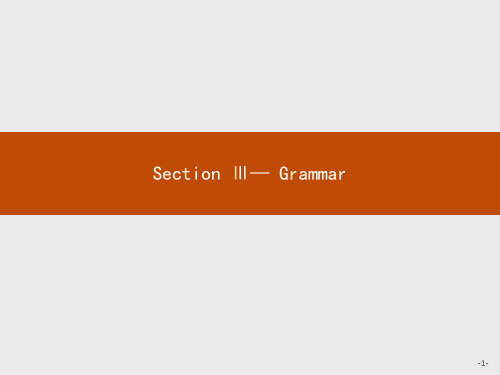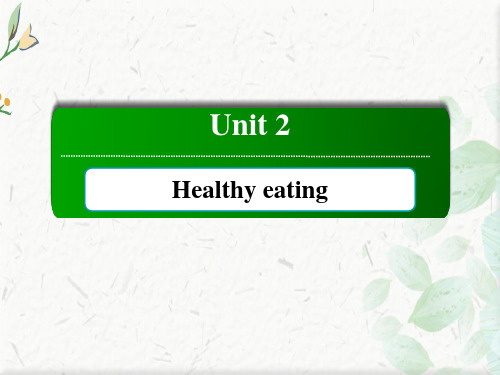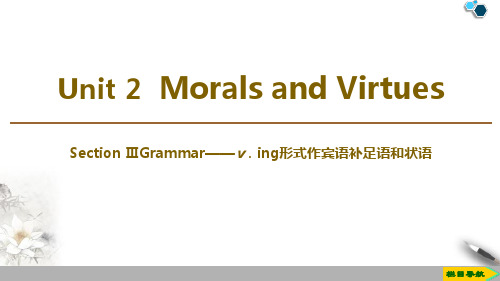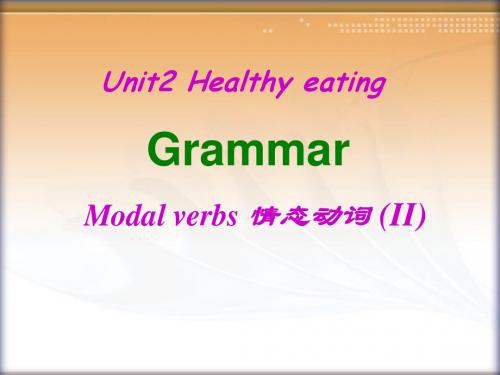高中英语人教版必修三课件:Unit 2 Section ⅢGrammar——情态动词(Ⅱ)
合集下载
新教材2023年高中英语 Unit 3 Section Ⅱ课件 新人教版必修第三册

—I won’t join them. ——我不和他们一起。 —Why(will you not join them)? ——为什么(你不和他们一起)?
6.动词不定式 —Are you going there? ——你打算去那里吗? —Yes,I’d like to(go there). ——是的,我想(去那里)。 —I saw her enter the classroom. ——我看见她进了教室。
2.简洁实用 (I’m) Coming. (我)来啦。 (It) Doesn’t matter. (它)不要紧。 3.句法允许 He got up at six(o’clock). 他六点(钟)起床。 This dictionary costs seven(dollars) thirty(cents). 这本词典的费用是7美元30美分。 What a hot day(it is)! 多热的天呀!
UNIT 3 DIVERSE CULTURES
Section Ⅱ Discovering Useful Structures
单元语法精析 语法专题练习
单元语法精析
知识概览
Grammar——省略
探究发现 ①And what a city(it is)—a city that was able to rebuild itself after the earthquake that occurred in 1906. ②My hotel is near downtown,in the Mission District,(which is) one of the oldest parts of the city. ③This district used to be a poor area of town,but (this district) is now a centre for art,music,and food. ④(It is) A real mix of cultures here! ⑤What great food (it is)! ⑥(I) Can’t wait!
人教课标版高中英语必修3Unit2_Grammar_公开课课件

5
can/could
Ability(能力 ,“能/会”)
34
Probability/guessing(可能/推测 “有时会/可能”) 1 2
Request/permission (请求/许可 “可以”)
5
Translation: 我以前可以跑得比其他任何男生都快。但现在跑步测试都过不了。
I could run faster than any other boy student before. But I can’t pass the running test now.
the three kinds of food if we want to be healthy.
Homework
1. Exchange your letter with each other and try to polish your writing
2. Look through the functions of moral verbs and try to remember some important examples.
Yours sincerely,
Jack
Situation II : Asking for Advice
May I know I would appreciate it
Could you please Would you like
• __________your ideas?
• ________________if you could give me some advice.
How are things going in your college life?
wer(55241899) 2013-3-11 21:37:14
can/could
Ability(能力 ,“能/会”)
34
Probability/guessing(可能/推测 “有时会/可能”) 1 2
Request/permission (请求/许可 “可以”)
5
Translation: 我以前可以跑得比其他任何男生都快。但现在跑步测试都过不了。
I could run faster than any other boy student before. But I can’t pass the running test now.
the three kinds of food if we want to be healthy.
Homework
1. Exchange your letter with each other and try to polish your writing
2. Look through the functions of moral verbs and try to remember some important examples.
Yours sincerely,
Jack
Situation II : Asking for Advice
May I know I would appreciate it
Could you please Would you like
• __________your ideas?
• ________________if you could give me some advice.
How are things going in your college life?
wer(55241899) 2013-3-11 21:37:14
人教版高中英语必修三Unitgrammar教学课件

What do we call them? We call them great heroes.
Who is this?
This is a computermade picture of the bride in ancient Loulan.
What do we call her?
We call her the Loulanammar
Practice 1
What do you find? I find nobody in the classroom. I find the classroom clean and tidy. I find the classroom to be clean and tidy.
_____ you or he the teacher of English?
Not only I but Jane and Mary _____ tired of having one examination after another. A. is B. are C. am D. be
Homework:Translation
at home
人教版高中英语必修三Unitgrammar
人教版高中英语必修三Unitgrammar
Q3: 什么结构可以做宾补?
Usage: 宾补, 是对宾语的补充说明, 可以是名词, 名词 短语, 形容词, 不定式to do, 省to的不定式do, 或介词短语.
人教版高中英语必修三Unitgrammar
Homework
• 1 What we need ______(be) potatoes. • 2 What we need ______(be) your permission. • 3 I believe ______ a good idea to go swimming. • 4 He is one of the students who ______(attend)
Who is this?
This is a computermade picture of the bride in ancient Loulan.
What do we call her?
We call her the Loulanammar
Practice 1
What do you find? I find nobody in the classroom. I find the classroom clean and tidy. I find the classroom to be clean and tidy.
_____ you or he the teacher of English?
Not only I but Jane and Mary _____ tired of having one examination after another. A. is B. are C. am D. be
Homework:Translation
at home
人教版高中英语必修三Unitgrammar
人教版高中英语必修三Unitgrammar
Q3: 什么结构可以做宾补?
Usage: 宾补, 是对宾语的补充说明, 可以是名词, 名词 短语, 形容词, 不定式to do, 省to的不定式do, 或介词短语.
人教版高中英语必修三Unitgrammar
Homework
• 1 What we need ______(be) potatoes. • 2 What we need ______(be) your permission. • 3 I believe ______ a good idea to go swimming. • 4 He is one of the students who ______(attend)
人教版高中英语必修三Unit3-Grammar.ppt

What we need is more time.
What we need are more English
dictionaries.
一、Object Clauses 宾语从句
I know him . (简单句)
主语 谓语 宾语
I know who he is . (复合句)
主语 谓语 连词 从句主语 从句谓语
{I don’t know about the man, Mr. White.
同位语 I don’t know about the fact that he is a teacher.
什么叫名词性从句?
在句子中起名词作用的句子叫名词从句。 (Noun Clauses)
名词从句的功能相当于名词词组, 它在 复合句中能担任主语、宾语、表语、同 位语等。
主句
宾语从句
宾语从句的概念: 宾语从句在复合句中作主句的宾语。
句子结构: 主句+连词(引导词)+宾语从句
1. 连词(引导词) 1) 当宾语从句是陈述句时(包括肯定句和
否定句), 连词由that引导, 因为that在从句 中不作任何成分, 也没有任何具体意思, 因此在口语或非正式文体中常省略。 Lin Tao feels (that) his own team is even better. She says (that) she won’t take part in the sports meeting next Sunday. Jim thought (that) the train was like a big moving party.
6. My question is this: where will the lecture be given? →
What we need are more English
dictionaries.
一、Object Clauses 宾语从句
I know him . (简单句)
主语 谓语 宾语
I know who he is . (复合句)
主语 谓语 连词 从句主语 从句谓语
{I don’t know about the man, Mr. White.
同位语 I don’t know about the fact that he is a teacher.
什么叫名词性从句?
在句子中起名词作用的句子叫名词从句。 (Noun Clauses)
名词从句的功能相当于名词词组, 它在 复合句中能担任主语、宾语、表语、同 位语等。
主句
宾语从句
宾语从句的概念: 宾语从句在复合句中作主句的宾语。
句子结构: 主句+连词(引导词)+宾语从句
1. 连词(引导词) 1) 当宾语从句是陈述句时(包括肯定句和
否定句), 连词由that引导, 因为that在从句 中不作任何成分, 也没有任何具体意思, 因此在口语或非正式文体中常省略。 Lin Tao feels (that) his own team is even better. She says (that) she won’t take part in the sports meeting next Sunday. Jim thought (that) the train was like a big moving party.
6. My question is this: where will the lecture be given? →
人教版高中英语必修第三册精品课件 Unit 2 Section Ⅲ

【即学即用】
完成句子
(1)我对他都绝望了,他做任何工作都超不过半年。
despair of him
I
;he can’t keep a job for more than six
months.
in
(2)他绝望地放弃了斗争。
He gave up the struggle
despair
.
3.Is there no one in this village who feels any responsibility to keep
2.The woman with a water pot on her head moved the stone out of the
way.( F )
3.Most people complained about the stone but did nothing.( T )
4.The girl was on her way home from school.( F )
我认为这个计划弊大于利。
_____________________________________________________
your
本
课
结
束
句型转换
(3)Staying up constantly can harm your health.
→Staying up constantly can be harmful to
/do harm to
health.
翻译句子
(4)I think this plan will do more harm than good.
【合作探究】
说一说·勤归纳
disguise oneself as把自己假扮成……
英语人教版必修3课件:Unit 2Section Ⅲ— Grammar

to/oughtn’t to,疑问式为:Ought I/you/he to...?常译作“应该,应当”。
语气比should稍重一些,表示有责任、义务等。
单句填空
I’m his teacher.I ought
(take) care of him.
答案:to take
They are having a class.You
6.will 7.can/can’t 答案:略
-2-
Section Ⅲ— Grammar
一二三
晨读晚诵
课课前前篇篇 自自主主预预习习
课堂篇 探究学习
随堂练习
二、用ought to,need,mustn’t完成句子
1.你应当向老师请求帮助。
You
ought to
ask your teacher for help.
单句填空
He ought to know what to do,
he?
答案:oughtn’t
3.表示推测,多指按照常理的一种推测,意为“按理应该……”。
翻译句子
已经九点了,他现在应该在办公室里。 翻译 答案:It is already 9 o’clock;he ought to be in his office now.
Ⅰ
Ⅱ
1.lose weight
A.失去兴趣
2.lose interest
B.丢脸;没有面子
3.lose heart
C.减肥
4.lose face
D.失去信心
-4-
Section Ⅲ— Grammar
晨读晚诵
课前篇 自主预习
课课堂堂篇篇 探探究究学学习习
随堂练习
-5-
2020-2021学年英语人教版必修3课件:Unit 2 Section Ⅲ Grammar

Unit 2
Healthy eating
Section Ⅲ Grammar
——情态动词(Ⅱ)—— 考点一 ought to 的用法 1.ought to“应该”。与 should 相比较,ought to 语气 重些,偏重“责任,义务,道德,法律”等方面。如: To keep fit, we ought to learn more about our body. 为了保持健康,我们应该多了解我们的身体。 Ought he to go? 他应该走吗? You ought not to do such a thing. 你不应该做这样的事。
You needn't have told me the news. I have already known it. 你本不必告诉我这个消息的,我已经知道了。
1.I ________ use a clock to wake me up because at six o'clock each morning the train comes by my house.
need 还可作实义动词,此时有人称、时态和数的变化,后 面接带 to 的动词不定式。常用的结构有两个:
(1)sb. need(s) to do sth. 意为“某人需要做某事”。如: I need to get up early tomorrow. 明天我需要早起。 You don't need to leave at once. 你不必立刻离开。
I must stop smoking. 我一定要戒烟。(主观看法) He has to go there right now. There is little time left. 他必须立刻去那儿。所剩时间不多了。(客观需要)
Healthy eating
Section Ⅲ Grammar
——情态动词(Ⅱ)—— 考点一 ought to 的用法 1.ought to“应该”。与 should 相比较,ought to 语气 重些,偏重“责任,义务,道德,法律”等方面。如: To keep fit, we ought to learn more about our body. 为了保持健康,我们应该多了解我们的身体。 Ought he to go? 他应该走吗? You ought not to do such a thing. 你不应该做这样的事。
You needn't have told me the news. I have already known it. 你本不必告诉我这个消息的,我已经知道了。
1.I ________ use a clock to wake me up because at six o'clock each morning the train comes by my house.
need 还可作实义动词,此时有人称、时态和数的变化,后 面接带 to 的动词不定式。常用的结构有两个:
(1)sb. need(s) to do sth. 意为“某人需要做某事”。如: I need to get up early tomorrow. 明天我需要早起。 You don't need to leave at once. 你不必立刻离开。
I must stop smoking. 我一定要戒烟。(主观看法) He has to go there right now. There is little time left. 他必须立刻去那儿。所剩时间不多了。(客观需要)
高中英语 人教版必修第三册 unit 2 grammar 课件

Being ill, he didn't go to school yesterday. = As he was ill, he didn't go to school yesterday.因为生病了,昨天他 没去上学。
3.作伴随状语(动词-ing形式表示的动作与谓语动词表示的动作同时 发生,相当于一个并列谓语)
7
I wish you would quit complaining.我希望你不再抱怨。 Chatting with each other, we enjoyed our dinner.我们边吃边聊。 2.动词-ing形式的完成式,表示动作发生在谓语动词之前。 Having finished work, she got ready to go shopping. 完成工作后,她准备去购物。
They stood there, waiting for the bus. = They stood there and waited for the bus. 他们站在那儿等公共汽车。
5
4.作结果状语(表示自然而然的结果,不定式短语作结果状语表示事 与愿违的结果) The hospital has recently obtained new medical equipment, allowing more patients to be treated. 最近这家医院已经获得了新的医疗设备,能让更多的病人得到治疗。
Hearing the knock on the door, they stopped talking. = When they heard the knock on the door, they stopped talking. 听到有人在敲门,他们停止了谈话。
3.作伴随状语(动词-ing形式表示的动作与谓语动词表示的动作同时 发生,相当于一个并列谓语)
7
I wish you would quit complaining.我希望你不再抱怨。 Chatting with each other, we enjoyed our dinner.我们边吃边聊。 2.动词-ing形式的完成式,表示动作发生在谓语动词之前。 Having finished work, she got ready to go shopping. 完成工作后,她准备去购物。
They stood there, waiting for the bus. = They stood there and waited for the bus. 他们站在那儿等公共汽车。
5
4.作结果状语(表示自然而然的结果,不定式短语作结果状语表示事 与愿违的结果) The hospital has recently obtained new medical equipment, allowing more patients to be treated. 最近这家医院已经获得了新的医疗设备,能让更多的病人得到治疗。
Hearing the knock on the door, they stopped talking. = When they heard the knock on the door, they stopped talking. 听到有人在敲门,他们停止了谈话。
高中英语 人教版必修三unit3grammar课件 共23张ppt

to always face difficulties and hope for the
best.
(2018 北京)
A. how B. which C. the D. what
4. She asked me _w_h_e_t_h_e_r_/ _if_ I had returned
the books to the library, and I admitted
This is what we should do.
what在表语从句中作宾语,不能省略。
The question is how the tiger got out of the cage. how在从句中作状语,不能省略。
Find as many as possible the examples in the play where noun clauses are used as the predicative.
(
)
)(
1. that引导表语从句,只起连接作用,不作句子 成分。
引导表语从句的连词有that, whether, as if。 引导表语从句的连接代词有what, who, which。 引导表语从句的连接副词有when, where, how, why。
2. 当主句的主语为reason或是由 why引导的主语从 句时,与它相关的表语从句的连词要用that而 不能 用because。 3. 可接表语从句的词除系动词be
C. whoever
D. whatever
2. Without his support, we wouldn’t be
__C___ we are now.
(2018 北京)
A. how B. when C. where D. why
高中英语人教版必修三课件:Unit+2+Section+Ⅲ+Grammar—情态动词(Ⅱ)

(2)needn't 意为“不必”,表示客观上不必如何。 We needn't hurry, for there's plenty of time. 我们不必这么匆忙,因为时间很充裕。 2.作实义动词 need 作实义动词时,后可接名词、动名词、不定 式等,有人称、时态和数的变化。 The door needs painting. = The door needs to be painted. 那扇门需要油漆一下。
即时演练 2 用 need 或 must 完成句子 ①你现在不必去那儿。 You needn't go there now. ②——他有必要留在这儿吗? ——是的,他必须。/不,他不必要。 — Need he stay here? —Yes, he must ./No, he needn't .
1.have to“不得不”,有时态、人称和数的变 化,其否定形式为 don't/doesn't/didn't have to。
9.He finished all the work himself; in fact, he could have asked his friends for help. (need/could) 10.Something terrible must have happened if Li Chang was not coming to eat in his restaurant as he always did.(have to/must)
“情态动词+have done”表示对过去事情的推 测。具体用法如下表:
They could have sent up the satellite successfully. 他们本来有能力成功发射这颗卫星的。 You ought to/should have studied harder. 你本应该更努力学习的。 Mary might have learned some Chinese before. 玛丽以前可能已学过一些中文了。 If I had a chance, I would have set off on a journey round the world. 要是有机会,我早就环游世界了
人教版英语必修三unit3 grammar(共60张ppt)

注:当从句的原句为以下句子
以及what, who作主语时,语序不变:
What’s wrong? What’s the matter? What’s happening? What happened?
e.g. I don’t know what’s the matter.
做主语
Can you tell me who is over there? Can you tell me who he is ?
survive until tomorrow. 9. The fact is _t_h_a_t_ I earned my money
by working hard. 10. That’s _w__h_y_ we’ve given you the
letter.
11. They don't know _w__h_e_nwe will come back. 12. She wanted to know ______ book you like
注:that 在句中无意义,在从句中不能 充当成分,可以省略。
e.g.
•He said (that) he missed us very much
•The teacher told us (that) the earth moves around the sun
that——不能省略的2种情况
(1)当and 连接两个或两个以上的宾语从句时, 只有第一个and可省。
(一般过去时,过去进行时,过去将来时,过去完成时)
I knew who lived here. I saw she was talking with her mother. He asked whether his father would come back tomorrow. He said that he had seen it .
《Morals and Virtues》SectionⅢ 课件下载-高中英语人教版必修三PPT课件

英语课件 /kejian/ yingyu /
栏栏目目导导航航
9
二、v.ing 形式作状语
1.现在分词或分词短语作状语时,可以在句中充当让步、时间、 原因、条件、结果、方式、伴随或补充说明等状语。与句子的主语有 逻辑上的主谓关系(是主动的)。
Not coming on time, he was punished.= Because he didn't come on time,he was punished.(原因)
英语课件 /kejian/ yingyu /
栏栏目目导导航航
6
(2)当主句转换为被动结构时,原来作宾语补足语的 v.ing 形式 便转换为主语补足语。
They found the result very satisfying. =The result is found very satisfying. 这个结果很令人满意。 They heard him singing in the next room. =He was heard singing in the next room. 有人听到他在隔壁房间唱歌。
英语课件 /kejian/ yingyu /栏栏目目导导航航7
2.能用 v.ing 形式作宾语补足语的几类动词: (1)表示感觉和心理状态的动词,常见的有 see,hear,feel,smell, find,notice,observe,look at,listen to 等。 We saw a light burning in the window. 我们看见窗户里有一盏灯在亮着。 Can you smell anything burning? 你闻见有东西烧着了吗?
读书的时候,他不时地点头。 Working hard,you will succeed.=If you work hard,you will succeed.(条件) 努力,你就会成功。
高一英语必修三Unit2_Grammar课件

2 could, might, would 表委婉语气用于疑问句, 答语仍须用 can, may, will.
3 can 用于肯定句中, 可表示”有时可能”
情态动词 含义
否定式
注
意
点
表许可 mustn’t
口语中也可用can’t
may /
might
“可以”“不许,严禁”
表推测 May not “可能”“可能不” 主要用于肯定句, 不能用在疑问句
He daren’t to speak id he?
He daren’t speak English before such a crowd, dare he?
Nobody need to be afraid of catching the disease. Nobody need be afraid of catching the disease.
2.作实义动词用,常用在肯定句中, 有人称、 时态、和数的变化 He needs to go there himself. He has grown up,we don’t need to worry about him.
3.Sth (sb) need( want, request)+ doing/ to be done The house needs cleaning/ to be cleaned The boy needs sending to the hospital at once.
可兼做行为动词的情态动词:need 、 dare 1.作为情态动词用,常用在否定句和疑问句中。 Dare (need) +S +V S + daren’t (needn’t) +V I daren’t walk through the forest at night. Dare you walk through the forest at night? You needn’t return the book now. Need he go yesterday?
3 can 用于肯定句中, 可表示”有时可能”
情态动词 含义
否定式
注
意
点
表许可 mustn’t
口语中也可用can’t
may /
might
“可以”“不许,严禁”
表推测 May not “可能”“可能不” 主要用于肯定句, 不能用在疑问句
He daren’t to speak id he?
He daren’t speak English before such a crowd, dare he?
Nobody need to be afraid of catching the disease. Nobody need be afraid of catching the disease.
2.作实义动词用,常用在肯定句中, 有人称、 时态、和数的变化 He needs to go there himself. He has grown up,we don’t need to worry about him.
3.Sth (sb) need( want, request)+ doing/ to be done The house needs cleaning/ to be cleaned The boy needs sending to the hospital at once.
可兼做行为动词的情态动词:need 、 dare 1.作为情态动词用,常用在否定句和疑问句中。 Dare (need) +S +V S + daren’t (needn’t) +V I daren’t walk through the forest at night. Dare you walk through the forest at night? You needn’t return the book now. Need he go yesterday?
高中英语人教必修三课件:Unit+3+Section+Ⅲ+Grammar+—宾语从句和表语从句

2.连接词的用法 (1)that 引导的宾语从句
I think (that) you should turn to the teacher for help.
我认为你应该向老师寻求帮助。 I am afraid (that) I've made a mistake. 恐怕我已经犯了一个错误。
The Swede stood quite still, except that his lips moved slightly.ห้องสมุดไป่ตู้
自主探究
(1)左栏 6 个句子中的黑体部分都是主句中的从句,
这些从句在词性上相当于一个 名词
,故被称
作 名词性 从句。
(2)句①②③④中的黑体部分属于宾语从句。
(3)句 ⑤⑥ 中的黑体部分属于表语从句。
[语法剖析]
1.概念:在主从复合句中充当宾语的从句,叫 做宾语从句。它可以充当句中谓语动词、介词或形 容词的宾语,有时也作非谓语动词的宾语。
[语法初识]
原句感知 ①Oliver believes that with a million pound bank note a man could survive a month in London. ②It is Henry Adams, an American businessman, who is lost in London and does not know what he should do.
(3)连接代词和连接副词引导的宾语从句 连接代词 who, whom, whose, what, which, whatever, whoever, whomever, whichever 和连接副词 when, where, how, why,这些连接词都有词义,除引导从句外,还在 从句中充当一定的成分,可作主语、宾语、表语、定语、 状语等。这种宾语从句有疑问意义,但不是疑问句,不 能用疑问语序,而要用陈述语序。
- 1、下载文档前请自行甄别文档内容的完整性,平台不提供额外的编辑、内容补充、找答案等附加服务。
- 2、"仅部分预览"的文档,不可在线预览部分如存在完整性等问题,可反馈申请退款(可完整预览的文档不适用该条件!)。
- 3、如文档侵犯您的权益,请联系客服反馈,我们会尽快为您处理(人工客服工作时间:9:00-18:30)。
5. You needn't buy (not buy) a gift,but you can if you want to. 6. Look! The road is wet.It must have rained (rain) last night. 7. Bob ought not to speak (not speak) to his mother like that. 8.You must come (come) here on time,or you'll be fined next time. 9.Hurry up! We ought to/should go (go) to school right away. 10.Her eyes are red.She must have been (be) crying.
3.“应该”,表示推测。可与 should 换用。 Mary ought to be here soon. 玛丽应该很快就来了。 This is where the oil ought to/should be. 这里应该就是石油存在的地方。
[即时训练 1] 用 ought to 补全句子
①下次过马路时,你应该更小心些。 You ought to be more careful when you cross the road next time. ②你不该责备他。
[考点警示] have to,must (1)两者都可意为“必须,应该”,但 have to 表示客观的需要,而 must 表示说话人主观上的看法,即主观上的必要。 (2)have to 有人称、数和时态的变化,而 must 只有一种形式。 He had to look after his sister yesterday. 昨天他不得不照顾他的妹妹。
can/could have done
1.过去可能(表推测) 2.本能做而未做(表虚拟)
should/ought to have done
本该做而未做
may/might have done
must have done needn't have done
1.过去也许做了(表推测) 2.本可能做而未做(表虚拟) 一定已经做了 本不必做而做了
From what you said,she must have told you all about it. 从你所说的来看,她一定把一切都告诉你了。 You should have told me earlier or I might have gone with them.你应该早 点告诉我,不然的话我就会和他们一块去了。 They could have sent up the satellite successfully. 他们本来有能力成功发射这颗卫星的。
Unit 2 Healthy eating Section Ⅲ Grammar——情态动词(Ⅱ)
[语 境 自 主 领 悟]
先观察原句
后自主感悟
①By now his restaurant ought to be full 1.以上句子中,句①④⑤⑥中的黑体词都
of people.
是情态动词,而句②③中的黑体词是实义
The house needs/wants/requires repairing/to be repaired. 这所房子需要修葺。
[即时训练 3] 完成句子 ①我的房间很乱,但今晚出去之前我不需要打扫,我会早晨打扫的。 My room is in a mess,but I needn't clean it before I go out tonight.I can do it in the morning.
(应
当限制在 400 词左右).
3.The last important thing you should remember (你应当记住的是)is that
you have to send the article to me before June 28. 4.George can't have gone (不可能走) too far.His coffee is still warm.
②——我需要留下来帮他们吗? ——是的,你必须留下来。不,你不必。 — Need I stay to help them? —Yes, you must./No, you needn't .
四、情态动词+have done
“情态动词+have done”表示对过去事情的推测。各情态动词的这种具
体用法如下表:
2.“应该”,表示劝告、建议或命令。should 和 ought to 可通用,但在 疑问句中常用 should。ought to 的否定式为 oughtn't to 或 ought not to。
You ought to balance career and family. 你应该平衡好事业与家庭之间的关系。 Should I open the window? 我可以打开窗户吗?
You ought to/should have been more careful. 你本应该更小心一些的。 You needn't have told them about it. 你本来没有必要告诉他们那件事。
[即时训练 4]完成句子 ①我从未玩得更开心过——这是完美的一天。 I couldn't have enjoyed myself more—it was a perfect day. ②他们本应该在午饭时间就到达的,但是他们的航班被耽搁了。 They should have arrived at lunchtime but their flight was delayed.
[即时训练 2] 完成句子(每空 1 词) ①他没有钱,只好放弃这个计划。 He had no money,so he had to give up this plan. ②你千万不能告诉他这个秘密。 You mustn't tell him the secret. (3)——我们必须今天下午交作业吗? ——不,你不必。 —Must we hand in our homework this afternoon? —No,you don't have to.
if Li Chang was not coming to eat in his
不”。
restaurant as he always did.
[语 法 精 要 点 拨]
一、ought to 的用法 1.“应该”,表示责任或义务。用于表示按道理应当,常指客观的义务 或责任,大多数情况下可用 should 代替,但比 should 语气重。 You ought to study harder than your brother. 你应该比你哥哥更努力学习。 I should help her because she is in trouble. 她有困难了,我应该帮助她。
—Need I hand in my paper now? —Yes,you must./No,you needn't. ——我现在需要交上论文吗? ——是的,你必须。/不,你不需要。
(2)作为实义动词,同其他实义动词一样,可用于各种句式,有时态、人 称和数的变化,构成否定句和疑问句时要借助于助动词 do。
②Does your father need any help?
动词。
③What do we need to take for the picnic?
2.以上各句中的情态动词后都接动词原
④There is enough time.You needn't hurry. 形。其中句⑥中 must have happened 的意
三、need 的用法 (1)need 作情态动词时,后跟动词原形,表示“需要,有必要”,无人称 和数的变化,多用于否定句、疑问句或条件句中。 You needn't go there now.你不必现在去那儿。 Need I go there now?我现在需要去那儿吗?
[考点警示] 由 need 引导的一般疑问句的肯定回答常用 must 或 have to, 否定回答常用 needn't。
Ⅱ.完成句子
1.I have just found that I have to attend an important class meeting
(我必须参加一个重要的班会) that afternoon.
2.The length of the article should be limited to 400 words or so
7.—Sorry,Mum!I failed the job interview again. —Oh,it's too bad.You should have made full preparations (本应该做 充足的准备).
⑤His mother is ill.He has to stay at home 思是“一定已经发生了”。
to look after her. ⑥Something terrible
3.上述句子中 ought to 意为“应该”; must have happened
need 意为“需要”;has to 意为“不得
You oughtn't/ought not to scold
him.
③——我应该明天动身吗?
——是的,你应该。
— Ought I to leave tomorrow?
—Yes, you ought to .
二、have to 的用法 have to 意为“不得不”,有时态、人称和数的变化,其否定形式和疑问 形式需要借助于助动词 do。 It was raining outside;we had to stay at home. 外面下雨了,我们不得不待在家里。
